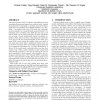Free Online Productivity Tools
i2Speak
i2Symbol
i2OCR
iTex2Img
iWeb2Print
iWeb2Shot
i2Type
iPdf2Split
iPdf2Merge
i2Bopomofo
i2Arabic
i2Style
i2Image
i2PDF
iLatex2Rtf
Sci2ools
140
click to vote
CCS
2006
ACM
2006
ACM
EXE: automatically generating inputs of death
This paper presents EXE, an effective bug-finding tool that automatically generates inputs that crash real code. Instead of running code on manually or randomly constructed input, EXE runs it on symbolic input initially allowed to be "anything." As checked code runs, EXE tracks the constraints on each symbolic (i.e., input-derived) memory location. If a statement uses a symbolic value, EXE does not run it, but instead adds it as an input-constraint; all other statements run as usual. If code conditionally checks a symbolic expression, EXE forks execution, constraining the expression to be true on the true branch and false on the other. Because EXE reasons about all possible values on a path, it has much more power than a traditional runtime tool: (1) it can force execution down any feasible program path and (2) at dangerous operations (e.g., a pointer dereference), it detects if the current path constraints allow any value that causes a bug. When a path terminates or hits a ...
| Added | 20 Aug 2010 |
| Updated | 20 Aug 2010 |
| Type | Conference |
| Year | 2006 |
| Where | CCS |
| Authors | Cristian Cadar, Vijay Ganesh, Peter M. Pawlowski, David L. Dill, Dawson R. Engler |
Comments (0)

